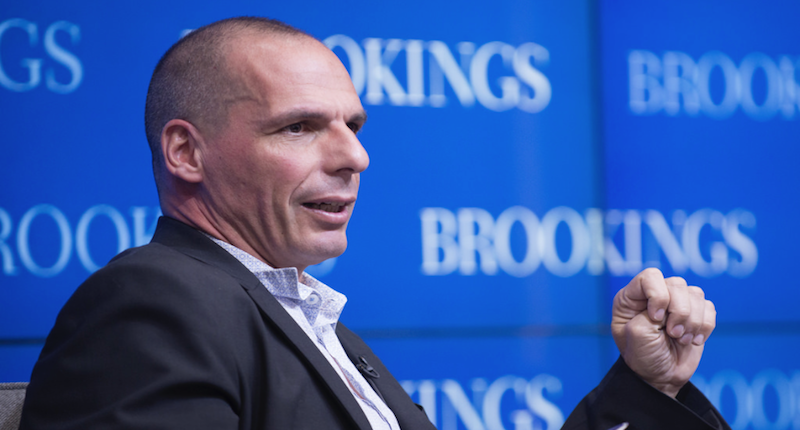Debt restructuring has always been our aim
Red. Vieles wird über den zurückgetretenen griechischen Finanzminister geschrieben. Dessen Argumente aber kommen meistens zu kurz. Deshalb veröffentlicht Infosperber hier, was Varoufakis am 10. Juli 2015 im «Guardian» über die Verhandlungen mit der EU veröffentlicht hat. Er ist überzeugt, dass Wolfgang Schäuble von Anfang an einen Grexit wollte.
—
YANIS VAROUFAKIS
Greece’s financial drama has dominated the headlines for five years for one reason: the stubborn refusal of our creditors to offer essential debt relief. Why, against common sense, against the IMF’s verdict and against the everyday practices of bankers facing stressed debtors, do they resist a debt restructure? The answer cannot be found in economics because it resides deep in Europe’s labyrinthine politics.
In 2010, the Greek state became insolvent. Two options consistent with continuing membership of the eurozone presented themselves: the sensible one, that any decent banker would recommend – restructuring the debt and reforming the economy; and the toxic option – extending new loans to a bankrupt entity while pretending that it remains solvent.
Official Europe chose the second option, putting the bailing out of French and German banks exposed to Greek public debt above Greece’s socioeconomic viability. A debt restructure would have implied losses for the bankers on their Greek debt holdings.Keen to avoid confessing to parliaments that taxpayers would have to pay again for the banks by means of unsustainable new loans, EU officials presented the Greek state’s insolvency as a problem of illiquidity, and justified the »bailout” as a case of »solidarity” with the Greeks.
To frame the cynical transfer of irretrievable private losses on to the shoulders of taxpayers as an exercise in »tough love”, record austerity was imposed on Greece, whose national income, in turn – from which new and old debts had to be repaid – diminished by more than a quarter. It takes the mathematical expertise of a smart eight-year-old to know that this process could not end well.
Once the sordid operation was complete, Europe had automatically acquired another reason for refusing to discuss debt restructuring: it would now hit the pockets of European citizens! And so increasing doses of austerity were administered while the debt grew larger, forcing creditors to extend more loans in exchange for even more austerity.
Our government was elected on a mandate to end this doom loop; to demand debt restructuring and an end to crippling austerity. Negotiations have reached their much publicised impasse for a simple reason: our creditors continue to rule out any tangible debt restructuring while insisting that our unpayable debt be repaid »parametrically” by the weakest of Greeks, their children and their grandchildren.
In my first week as minister for finance I was visited by Jeroen Dijsselbloem, president of the Eurogroup (the eurozone finance ministers), who put a stark choice to me: accept the bailout’s »logic” and drop any demands for debt restructuring or your loan agreement will »crash” – the unsaid repercussion being that Greece’s banks would be boarded up.
Five months of negotiations ensued under conditions of monetary asphyxiation and an induced bank-run supervised and administered by the European Central Bank. The writing was on the wall: unless we capitulated, we would soon be facing capital controls, quasi-functioning cash machines, a prolonged bank holiday and, ultimately, Grexit.
The threat of Grexit has had a brief rollercoaster of a history. In 2010 it put the fear of God in financiers’ hearts and minds as their banks were replete with Greek debt. Even in 2012, when Germany’s finance minister, Wolfgang Schäuble, decided that Grexit’s costs were a worthwhile »investment” as a way of disciplining France et al, the prospect continued to scare the living daylights out of almost everyone else.
By the time Syriza won power last January, and as if to confirm our claim that the »bailouts” had nothing to do with rescuing Greece (and everything to do with ringfencing northern Europe), a large majority within the Eurogroup – under the tutelage of Schäuble – had adopted Grexit either as their preferred outcome or weapon of choice against our government.
Greeks, rightly, shiver at the thought of amputation from monetary union. Exiting a common currency is nothing like severing a peg, as Britain did in 1992, when Norman Lamont famously sang in the shower the morning sterling quit the European exchange rate mechanism (ERM). Alas, Greece does not have a currency whose peg with the euro can be cut. It has the euro – a foreign currency fully administered by a creditor inimical to restructuring our nation’s unsustainable debt.
To exit, we would have to create a new currency from scratch. In occupied Iraq, the introduction of new paper money took almost a year, 20 or so Boeing 747s, the mobilisation of the US military’s might, three printing firms and hundreds of trucks. In the absence of such support, Grexit would be the equivalent of announcing a large devaluation more than 18 months in advance: a recipe for liquidating all Greek capital stock and transferring it abroad by any means available.
With Grexit reinforcing the ECB-induced bank run, our attempts to put debt restructuring back on the negotiating table fell on deaf ears. Time and again we were told that this was a matter for an unspecified future that would follow the »programme’s successful completion” – a stupendous Catch-22 since the »programme” could never succeed without a debt restructure.
This weekend brings the climax of the talks as Euclid Tsakalotos, my successor, strives, again, to put the horse before the cart – to convince a hostile Eurogroup that debt restructuring is a prerequisite of success for reforming Greece, not an ex-post reward for it. Why is this so hard to get across? I see three reasons.
One is that institutional inertia is hard to beat. A second, that unsustainable debt gives creditors immense power over debtors – and power, as we know, corrupts even the finest. But it is the third which seems to me more pertinent and, indeed, more interesting.
The euro is a hybrid of a fixed exchange-rate regime, like the 1980s ERM, or the 1930s gold standard, and a state currency. The former relies on the fear of expulsion to hold together, while state money involves mechanisms for recycling surpluses between member states (for instance, a federal budget, common bonds). The eurozone falls between these stools – it is more than an exchange-rate regime and less than a state.
And there’s the rub. After the crisis of 2008/9, Europe didn’t know how to respond. Should it prepare the ground for at least one expulsion (that is, Grexit) to strengthen discipline? Or move to a federation? So far it has done neither, its existentialist angst forever rising. Schäuble is convinced that as things stand, he needs a Grexit to clear the air, one way or another. Suddenly, a permanently unsustainable Greek public debt, without which the risk of Grexit would fade, has acquired a new usefulness for Schauble.
What do I mean by that? Based on months of negotiation, my conviction is that the German finance minister wants Greece to be pushed out of the single currency to put the fear of God into the French and have them accept his model of a disciplinarian eurozone.
—
- Infosperber DOSSIER: Griechenland fordert die EU heraus.
—
Themenbezogene Interessenbindung der Autorin/des Autors
Yanis Varoufakis war bis zum 6. Juli 2015 Finanzminister in der Regierung von Alexis Tsipras.










Ich erachte Varoufakis als einen gescheiten und veratwortungsbewussten (Ex-) Minister. Er durchschaut die Umverteilung der Werte von unten nach oben, er erkennt die Schulden- bzw Zinsenfalle und er durschaut auch die Vertreter des Finanzadels, welche zwar Mandate des Volkes inne haben, jedoch etwas ganz anderes tun.
Der Störenfied Varoufakis ist nun (leider) nicht mehr im Amt, und so könnten nun «die Andern» ihr Gesicht wahren und echte Sanierungen einleiten. Ob sie dies tun, wird zeigen, was sie wirklich vertreten. Ich befürchte aber, dass diese Vertreter des Finanzadels in ihrem Siegestaumel noch mehr Realitätssinn verlieren werden. Oder geht es denen wirklich nur darum, vor der grossen Hyperinflation möglichst viel Realwerte auf ihren Haufen zu scheffeln?
Dass der Deutsche Finanzminister rechnen kann bezweifle ich nicht, mir scheint aber, dass er seine Rechnung nicht für «sein» Volk und schon gar nicht für andere Völker optimiert, für wen optimiert er denn?
Yanis Varoufakis ist einer der interessanteren Ökonomen, die Infosperber bisher publiziert hat. Lesenswert ist von Ihm auch «Bescheidener Vorschlag zur Lösung der Eurokrise (German Edition)». Zusammen mit Stuart Holland und James K. Galbraith, beides ebenfalls sozialdemokratische Ökonomen+Politiker.
MfG
Werner T. Meyer
Ja, richtig: Für wen optimiert und spart eigentlich der deutsche Finanzminister? Für WEN? Wohin fliesst all das eingesparte Geld?
Die Union wollte von Anfang an, seit Syriza die Wahlen gewonnen hat, «Regime Change». Das ist das Zauberwort für missliebige Regierungen.
Allerdings würde ich Grexit für das Beste halten, da diese Währungs- und Europäische Union ein Zwangskorsett mit deutscher Führerschaft ist. Aber der GLAUBE an die Union ist tief, sehr tief, wenn nicht gar fundamentalistisch. Die Währungs- und Europäische Union in Frage zu stellen grenzt an Ketzerei, die Ketzer sind reine Verschwörungstheoretiker, Populisten. Auf den Scheiterhaufen mit all jenen, die nicht an die wundersame Europäische- und Währungsunion glauben!
Schäuble träumt nach dem Text eines altbekannten Liedes: »… heute gehört uns Deutschland und morgen die ganze Welt."
Varoufakis ist nicht nur ein gebildeter kluger Ökonom, er hat auch noch Charakter. Jahrzehntelang hat man keinen solchen Politiker in Griechenland gesehen. Leider musste er vor der Herrschaft der Mächtigen kapitulieren, um den vor der Tür stehenden Faschismus in Griechenland zu bremsen.
Schäuble, Merkel und Co. wollen die Demokratiereste in Europa zerstören, um noch direkter und noch brutaler herrschen zu können. Ihnen und noch vielen anderen ist es völlig egal, wenn in Griechenland Babies und Betagte dahinsterben.
Die Geschichte wiederholt sich.
Interessant der Artikel von Constantin Seibt heute (15.) im Bund. Da sitzt der Ökonom Varoufakis einem EU-Verhandlungsteam gegenüber, das nur Bahnhof versteht. «Im Prinzip ging es Varoufakis hier wie jedem Professor, der in einer Parlamentskommission spricht – weder die Fragen danach noch die Beschlüsse werden etwas mit seiner Rede zu tun haben.» bilanziert Seibt. Aufschlussreich. Vielfach liest/hört/glotzt man es hier anders herum.
Werner T. Meyer